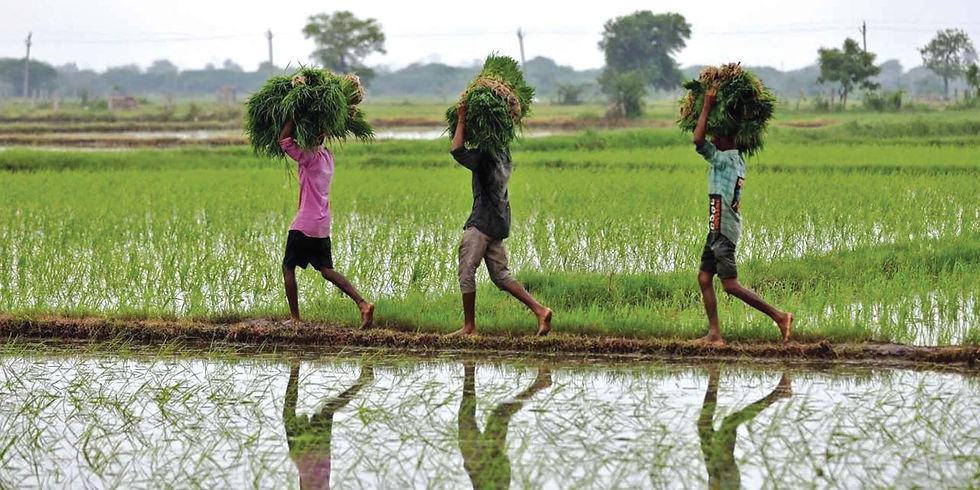Global Agricultural Trade in the Crosshairs
- Ramesh Patil

- Apr 29, 2025
- 3 min read
As Trump reshapes agricultural trade policies, the global economy braces for a new era of protectionism and competition.

U.S. President Donald Trump’s tariff policies are threatening to disrupt not only American agriculture but the entire global trading system that has been carefully constructed over decades. The US, with its vast resources of forests, farmland and subsidies, has long enjoyed an agricultural advantage over smaller countries.
The US has historically been a major agricultural exporter, thanks in large part to its land policies dating back to the country’s founding. With vast tracts of farmland, the US incentivized large-scale agriculture, rewarding landowners who managed hundreds or even thousands of acres. This contrasts sharply with countries like India, where small-scale farms dominate and agricultural subsidies are limited. The US can sell its produce at competitive prices in the world market because of extensive government support, a model that many smaller countries simply cannot replicate.
In response to America's dominance in agricultural exports, many smaller nations have resorted to high tariffs to protect their own industries from being swamped by cheap US goods. Trump’s new tariff policy, however, escalates the situation. He has declared that the US will impose tariffs matching those of any country that tries to protect its own agricultural sector, exacerbating tensions in global trade.
The World Trade Organization (WTO), designed to facilitate fair trade by reducing barriers, is at a crossroads. Its director-general has voiced concerns that without new agreements, the WTO risks irrelevance. As tariffs rise and trade agreements falter, the fundamental structure of global trade established in the aftermath of World War II is being strained. The multilateral trade framework that has fostered relative stability is being sidelined in favour of more fragmented, bilateral agreements, particularly with Pacific and Atlantic nations, where the US is pushing for favourable terms that avoid discussions on agricultural subsidies.
While small nations are grappling with these challenges, the situation is compounded by the Trump administration's broader retreat from international cooperation. The US has withdrawn from key international organizations, including NATO and the World Health Organization, citing dissatisfaction with the burdens placed on America. This has left developing countries to fend for themselves in addressing issues like climate change, with Europe’s promises of aid remaining unfulfilled.
The shift towards protectionism is already being felt at home in the US. Economic forecasts suggest that the high tariffs will lead to rising prices, potentially triggering a recession. Even the Federal Reserve has expressed concern, warning that the policy could destabilize both the US economy and the global financial system. Protests against Trump’s policies are erupting across the US, with hundreds of law firms preparing to challenge his tariff decisions in court.
In the ongoing trade war with China, the US is challenging not only Beijing’s economic model but also the global trade order. China, having recognized the limitations of depending on global markets, has shifted towards boosting domestic demand. This self-reliant model allows China to withstand external pressures, making it less susceptible to US trade tactics. The global economic future now seems to hinge on the outcome of this confrontation between the two largest economies.
With countries increasingly turning inward, the international order is fraying. The notion of global cooperation that underpinned the establishment of the UN, WTO, and other international bodies is under threat. A new ‘cold war’ between the US and China, as well as growing nationalist tendencies in Europe and other regions, risks isolating nations from one another, further undermining the possibility of coordinated action on critical issues like climate change, global health and economic equality.
The world is at a crossroads. For global trade to function in a stable and sustainable manner, there needs to be a radical rethinking of how international cooperation is structured. New frameworks for trade and diplomacy, one that accounts for the shifting dynamics of power and the economic realities of the 21st century, are urgently needed. As the US and China continue their battle for global influence, it is crucial that smaller nations, particularly in the Global South, are not left behind in this reshaped economic landscape. Only through renewed collaboration and a commitment to equitable growth can the global community hope to avoid an economic and geopolitical collapse.
(The author is a farmer and resident of Latur district.)





Comments